Affiliate disclosure: This post may contain affiliate links. Please see our Privacy Policy.
Pickled eggs are a real treat and the perfect tangy salty snack. Just pour a flavorful brine over hard-boiled eggs and stick them in the fridge, no canning required.

I’ll admit that I was pretty skeptical of pickled eggs. Aren’t they just some nasty bar food, like Prairie “oysters,” only consumed by people too drunk to know better?
That, of course, all changed when I had my first pickled egg.
Long ago, my now-husband took me on a date to one of the best craft beer bars in the northeast. It was a real treat, and the beer was exceptional, but they didn’t have a kitchen, just a selection of cheeses and pickles as snacks. My husband ordered a pickled egg, and I honestly looked at him in horror. You’re really going to eat that thing?
They brought out a tiny plate with a single hard-boiled egg, cut in half. It was drizzled with olive oil and decorated with a tiny tuft of microgreens, and I’ll give them credit, they really did make it look beautiful. I remained unconvinced until I watched a look of pure delight spread across his face at the first bite.
Now I had to know…I tentatively bit into the pickled egg…and was completely blown away.
Where hard-boiled eggs are bland and simple, pickled eggs are anything but. The vinegar brings them alive, and a salty brine is just right for dressing an unassuming egg. Add a tiny bit of sweetness to balance out the vinegar tang, and you’ve got a recipe for the perfect little flavor bomb.
Ten years later, I’m still experimenting with pickled egg recipes, finding new ways to infuse incredible flavor into our spring bounty of eggs. In all that time, I have yet to have a “bad” pickled egg, simply because it’s hard to mess these up.
Start with a simple brine, and add whatever spices tickle your fancy. It’s hard to go wrong…
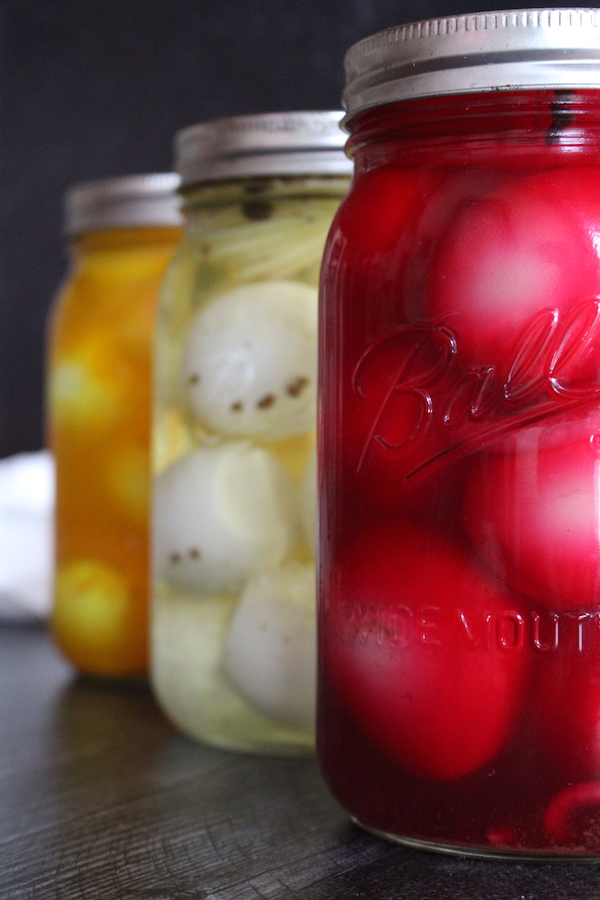
Easy Peel Hard Boiled Eggs
The hardest part of making pickled eggs is peeling hard-boiled eggs.
Everyone seems to have their own secret technique. I’ve tried many of them, and none of them seemed to really help. That is until I read an article from the New York Times where they tested all these folk methods head to head. Few of the tricks made any difference…but one method yielded perfectly cooked easy-peel hard boiled eggs.
Their steamed egg technique starts by bringing an inch of water to a boil in a pot and then lowering a steamer basket full of eggs to sit just above the already boiling water. They suggest an 11 minute steam for a just barely cooked yolk, but 12 minutes makes the perfect pickled egg in my opinion.
Our backyard flock’s production goes into overdrive each spring, and though we do preserve eggs using dozens of methods, there’s still an absurd amount left for pickling. So many that I’ve actually invested in big stainless steel steamer baskets, the kind they use in china town for homemade dumplings (gyoza).
Stacked three levels high in a big stockpot, they work perfectly for steaming up huge batches of hard-boiled eggs for pickled eggs.
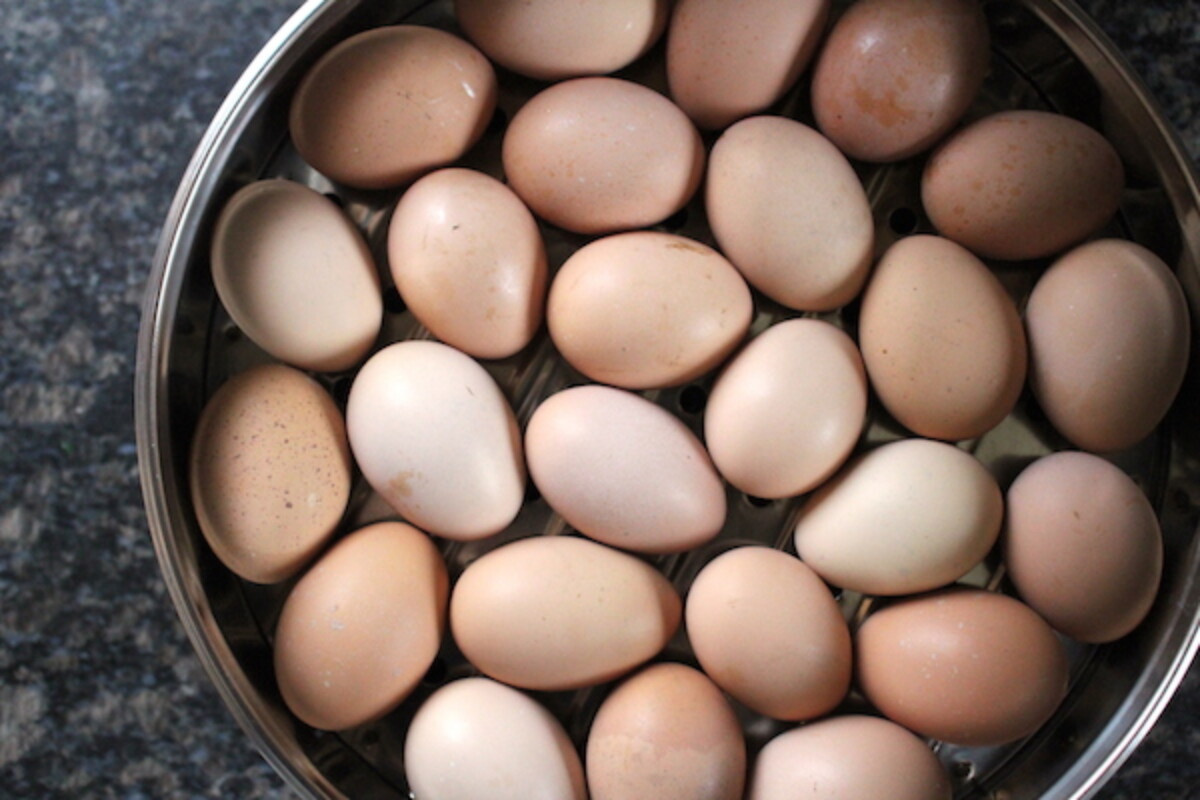
Once the eggs are cool, the kids and I go to work peeling them. It’s actually amazing for a little one’s fine motor skills, believe it or not.
With practice, my 2 and 4-year-old can work through peeling dozens of eggs without a nick in them. Their tiny hands love the puzzle, and they actually compete to see who can peel a perfect egg fastest.
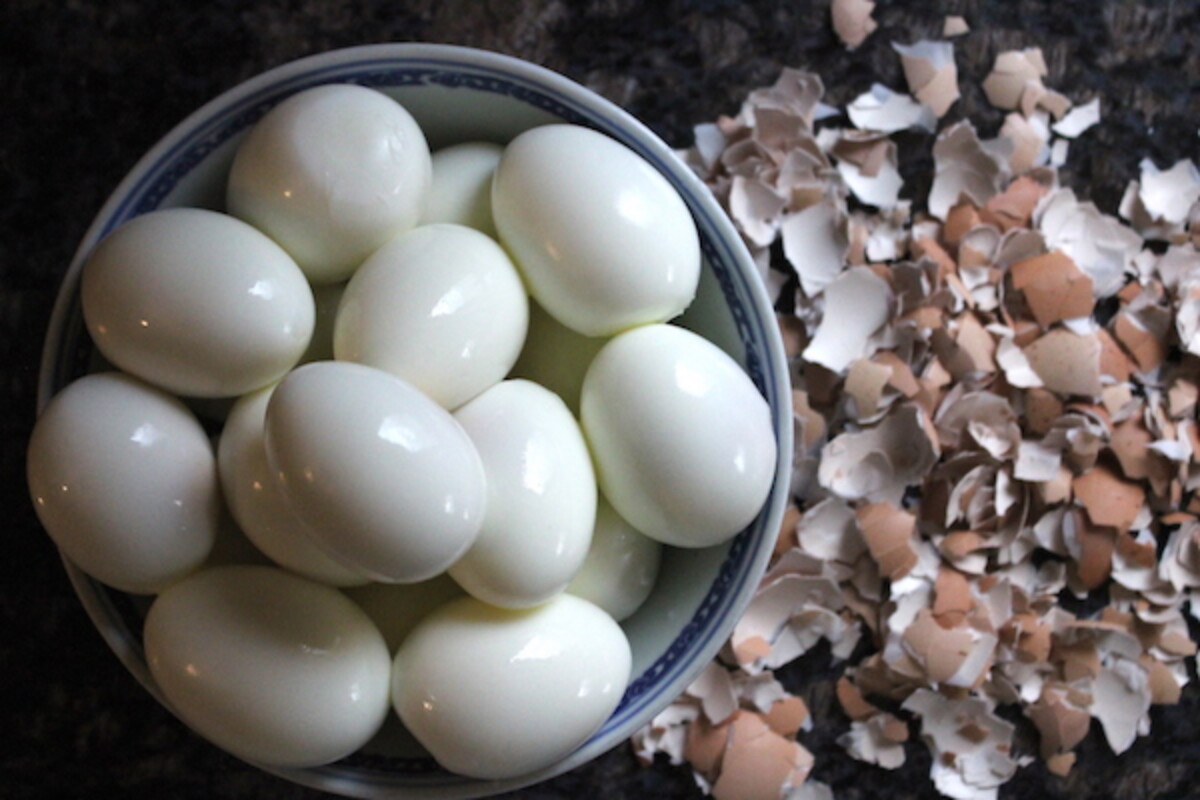
If you have a foolproof method that works for you, by all means, stick with it. If not, try 12-minutes of steam and you’ll marvel at how easy the eggs are to peel.
Brine for Pickled Eggs
The brine for pickled eggs is relatively flexible, and you can adjust the total amount of vinegar, salt, and sugar to suit your tastes.
A quart of 9-10 pickled eggs requires about 2 cups of brine, which is usually a mixture of water and white vinegar. Recipes range from 1 cup vinegar and 1 cup water, all the way up to just a straight 2 cups of vinegar (and everywhere in between). For pickled eggs, I’d suggest no less than half vinegar, as that’s required to help them keep in the refrigerator.
When I’m making milder pickled eggs for my kids, I’ll stick with a 1:1 ratio of vinegar and water. If you really want a more intense pickled egg, increase the vinegar, as I do when I’m making sweet bread and butter pickled eggs or spicy Jalapeño pickled eggs.
Salt and sugar, likewise, are pretty flexible. I find that 2 Tablespoons of each salt and sugar is about right for my tastes, most of the time. It’s just enough salt to season the eggs (without being too salty) and just enough sugar to help balance the tang of the vinegar, but without being noticeably sweet.
Many recipes use considerably more sugar, especially when making beet-pickled eggs or bread-and-butter pickled eggs. I’ve included recipes for those, and in my bread and butter variation, I use 1/2 cup sugar to a quart, along with an all-vinegar brine to help balance it out.
As you can see, the sky’s the limit when it comes to a pickled egg brine, but if you’re looking for a basic starter brine for pickled eggs, try this:
- 9-10 hard-boiled eggs (for 1-quart wide-mouth jar)
- 1 cup white vinegar
- 1 cup water
- 2 Tbsp. Salt
- 2 Tbsp. Sugar
- A few tsp of spices (your choice)
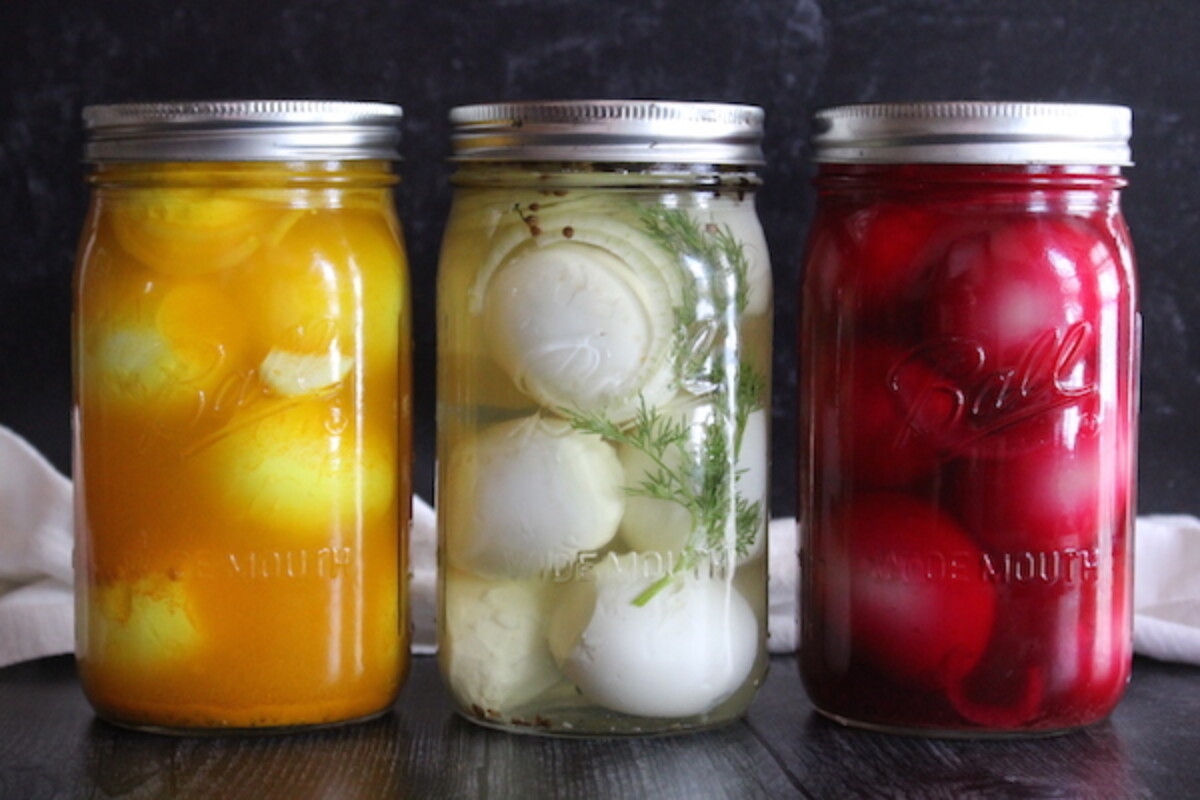
Spices for Pickled Eggs
Once you have a basic brine, the spices are based on your tastes. This is where you can be really creative and add incredible flavors (and colors) to the finished eggs.
Substituting beet juice for the water in a basic pickled egg recipe will add amazing color and a subtle sweetness that’s great with the vinegar brine. You can use actual beet juice from a juicer if you have one, or just the cooking water from a few small boiled beets.
Adding a teaspoon of turmeric likewise creates brilliant yellow pickled eggs, and that’s just what I do for my bread and butter pickled eggs.
Most pickled egg recipes have you add a tablespoon or two of pre-mixed “pickling spice” to the batch. I make a lot of pickles, but never in my life have I bought pre-mixed pickling spice. That stuff sits on the shelf at the store all year, and only really turns around cucumber season.
Generally, pickling spice includes whole mustard seeds, allspice, coriander, and bay leaves. It may also include cinnamon and cloves. Those are all excellent choices for homemade pickled eggs.
Other good options are hot sauce, Jalapeños, turmeric, horseradish, garlic, onions, dill, and tarragon.
How to Make Pickled Eggs
So now you know that recipes for pickled eggs are pretty versatile, but how do you make pickled eggs?
It’s pretty simple once you have peeled hard-boiled eggs.
Start by packing the hard-boiled eggs into a mason jar. I prefer wide-mouth quarts, and all the pickled egg recipes below are written for wide-mouth quart mason jars.
A quart jar will comfortably hold 9-10 large eggs. If you really work it, it’s possible to pack as many as 12 eggs into a jar…but they will be pressed so hard against the sides that the brine can’t infuse.
Add the liquid ingredients (water/vinegar/juice/etc) to a small saucepan and gently warm. Add the sugar and salt, stirring to just dissolve, and then remove from heat.
Add all the other dry spices and herbs to the egg jars, and then pour the warm brine directly over the eggs. Leave as little headspace as possible, ideally around 1/4 inch.
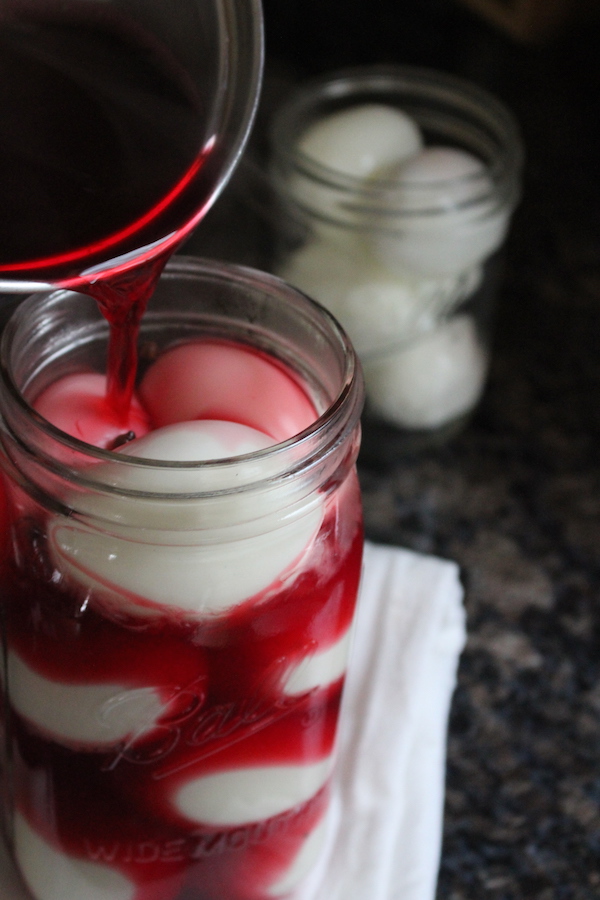
Cap tightly with a lid and allow the jars to cool slightly before storing them in the refrigerator.
Be sure that the eggs can freely move within the jar. Give the jar a gentle shake to ensure that the brine can easily reach all sides of the eggs and that they’re not packed too tightly.
Canning Pickled Eggs (Don’t Do it!)
Do not can pickled eggs. I cannot stress this enough. Pickled eggs are not safe for canning, no matter how much vinegar and salt you add to the brine.
That’s one reason pickled egg recipes are so variable because you simply cannot under any circumstances can them, so the acidity and salt are more about flavor than shelf-stable preservation.
Why can’t you can pickled eggs?
Water bath canning pickles isn’t really about sterilization. The idea is that the acidic brine will fully penetrate all the food, preventing extra nasty things like botulism that only thrive in low acid environments.
Low acid veggies like cucumber suck the vinegar right up, and it quickly acidifies through to the middle. The canning process is mostly about sealing the jar and creating a vacuum for the lid.
Eggs, on the other hand, are particularly dense, and it takes a long time for the acidic vinegar to penetrate the egg. Sources recommend leaving small and medium eggs in brine for at least 2 weeks to fully pickle, and as much as 4 weeks for large eggs.
Even still, the pickled acidity may never actually reach the center of the egg.
With all this in mind, know that canning pickled eggs is not safe, regardless of the method. University Extensions in the US explicitly caution against canning pickled eggs, and note that there are no tested methods. There is one documented case of someone getting botulism from pickled eggs, though they were not canned, just stored at room temperature.
There’s just not much testing for home canned pickled eggs, and all those store bought pickled eggs you find in jars contain chemical preservatives, as canning re-cooks the eggs anyway and changes their taste/texture.
Store pickled eggs in jars in the refrigerator, and avoid keeping them at room temperature.
How Long do Pickled Eggs Keep?
Given that canning pickled eggs isn’t an option, is pickling eggs actually working to preserve the eggs? How long do pickled eggs last in the refrigerator?
Pickled eggs last 3-4 months in the refrigerator, assuming they’re kept submerged beneath the vinegar brine. This also assumes that you use a brine that’s at least half vinegar, to actually pickle the eggs.
This is just a guideline for pickled egg shelf life though. Use your best judgment, and when in doubt, throw it out.
We make pickled eggs in the spring when our ladies are producing bumper crops of eggs, and then we enjoy them all summer long. It’s a nice treat when it’s too hot to cook, and they’re exceptionally good topped with fresh greens.
Pickled Egg Recipes
Over the years I’ve made dozens of pickled egg recipes, and they’ve all been good. I’ve included a good selection here of my four favorites, which should suit a broad variety of tastes.
These pickled egg recipes represent a good balance of colors, flavors, and sweet/sour ratios. (Printable recipe card a bit further down.)
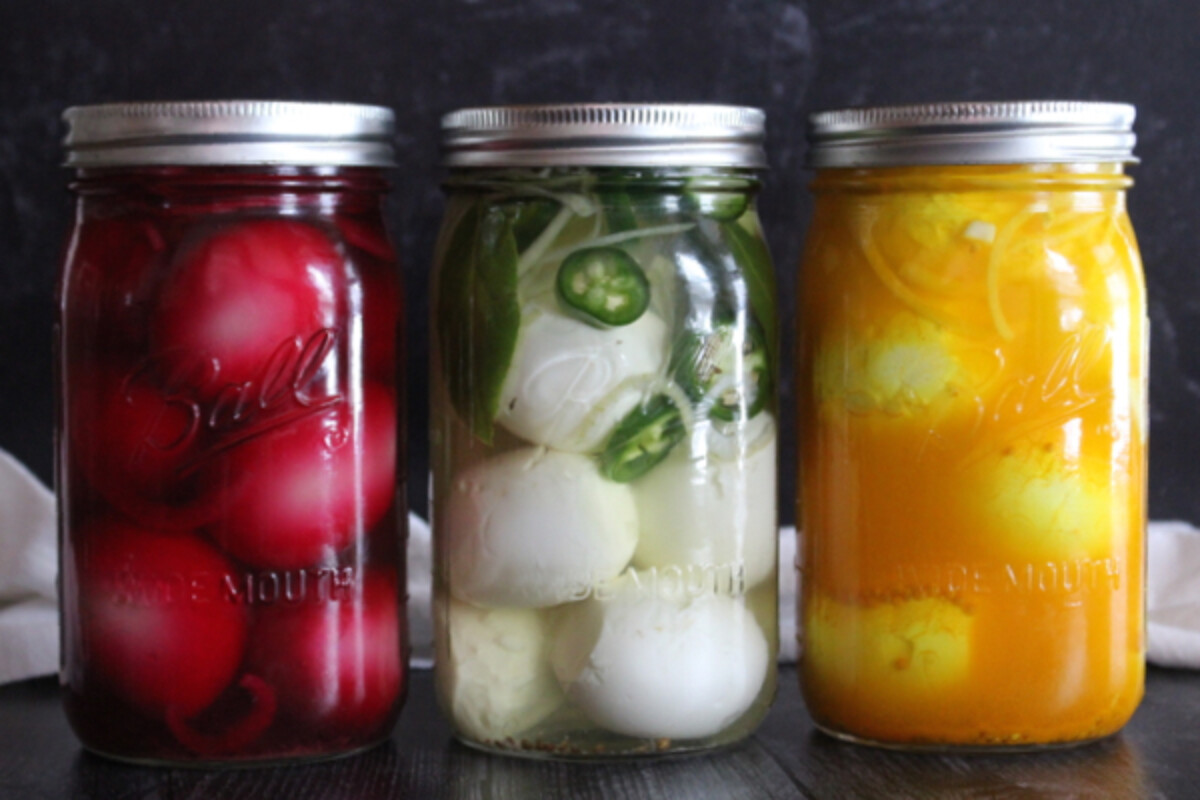
Beet pickled eggs
These are particularly beautiful, as the beet juice colors the outside of the egg and adds exceptional flavor. The simplest way to make them is to boil a few beets, and then save the cooking water for making the pickled egg brine. Some people choose to add sliced cooked beets to the jar, and that’s delicious too.
Beet pickled eggs are especially tasty with warm spices like cloves, allspice, and cinnamon.
Slice them on top of a salad for a splash of color, or serve them on a charcuterie plate for contrast.
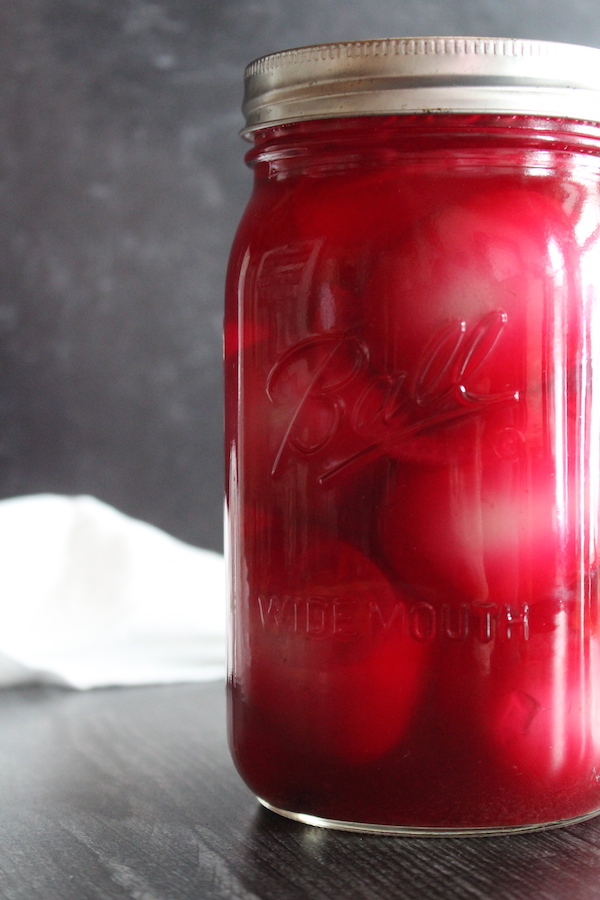
Bread and Butter Pickled Eggs
This recipe is based on my favorite recipe for bread and butter pickles made with cucumbers.
The brine is very similar, and an extra tangy all vinegar brine is balanced with a bit more sugar. Some recipes for bread and butter pickled eggs include as much as 1 cup of sugar, but that’s way over the top in my book. I think 1/4 to 1/2 cup is about right.
Adding a teaspoon of turmeric to the jars results in a bright yellow color, as is traditional with bread and butter pickles.
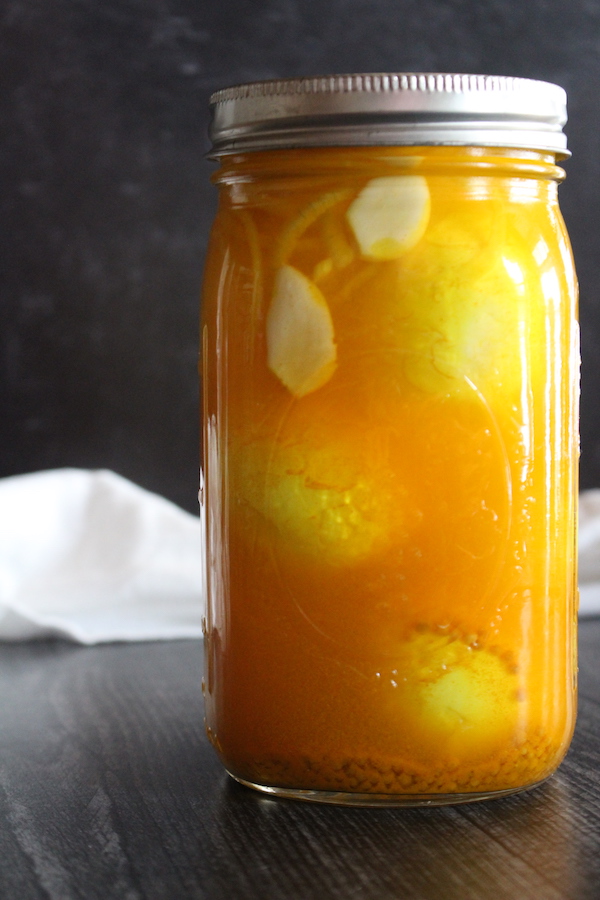
Dill Pickled Eggs
An old-school classic, dill cucumber pickles are most people’s favorite, and dill pickled eggs are no less awesome. These are my daughter’s favorite, with familiar flavors that she knows and loves.
Most of the “dill” flavor comes from dried dill seed, but if you can get a few sprigs of fresh dill that makes a lovely addition as well.
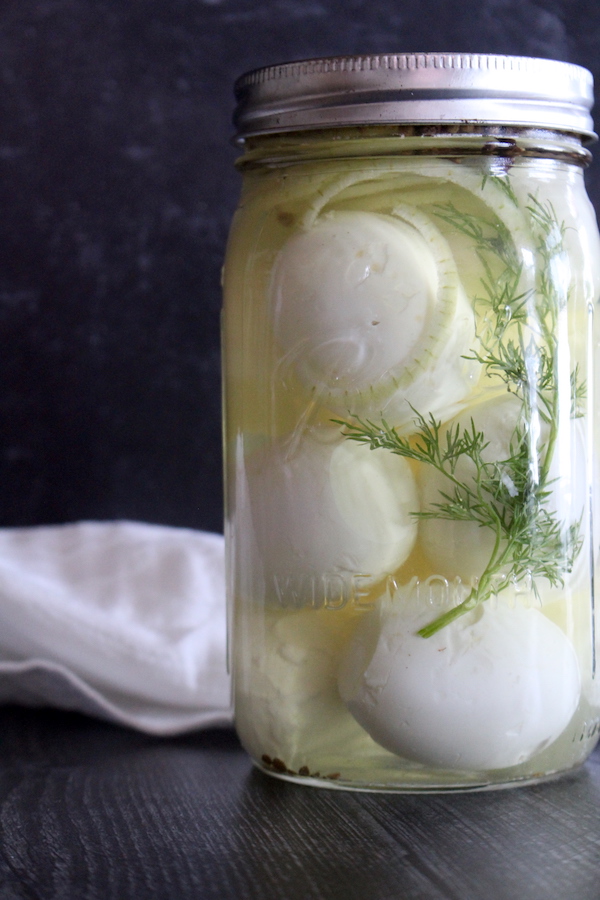
Spicy Jalapeño Pickled Eggs
My husband’s favorite, spicy pickled eggs add a whole new dimension to pickled eggs. You can add spice with just about anything spicy in the brine, and things like hot sauce and red pepper flakes are good options too.
I usually go with one whole sliced Jalapeño per jar, but feel free to adjust to your tastes.
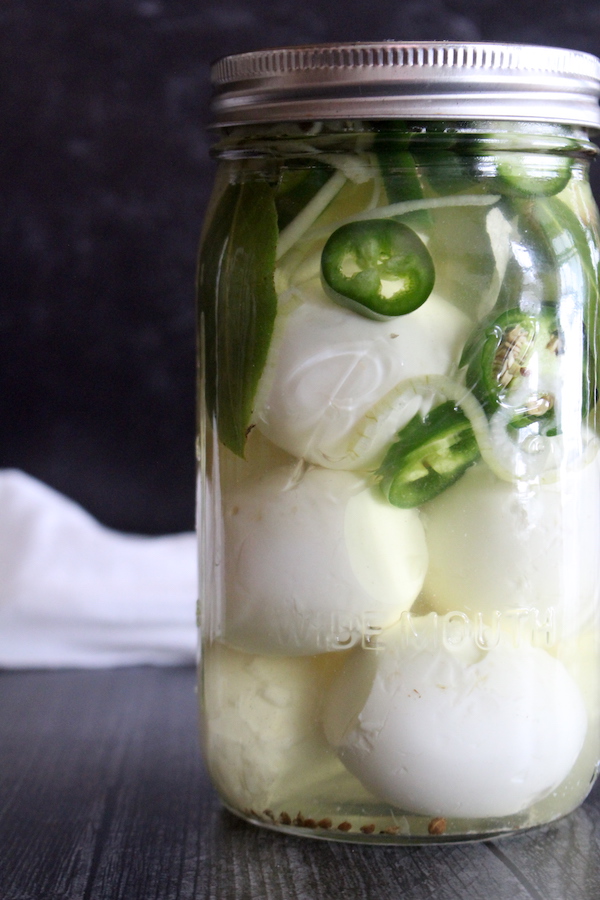
Ways to Preserve Eggs
Looking for more tasty ways to preserve eggs at home?
- Salt Cured Egg Yolks
- Pickled Quail Eggs
- Preserving Eggs in Lime Water (Keeps 12+ Months)
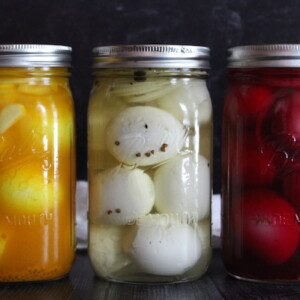
Pickled Eggs
Equipment
Ingredients
Beet Pickled Eggs
- 9-10 hard-boiled eggs, peeled
- 1 cup white vinegar
- 1 cup beet juice, or beet cooking water
- 1/2 small onion
- 2 Tbsp. sugar
- 2 Tbsp. salt
- 6-8 cloves
- 4-5 allspice berries
- 1 cinnamon stick
Bread and Butter Pickled Eggs
- 9-10 hard-boiled eggs, peeled
- 2 cups white vinegar
- 1/2 small onion, sliced
- 3-4 garlic cloves
- 2 Tbsp. salt
- 1/2 cup sugar
- 1 tsp mustard seeds
- 1 tsp celery seed
- 1 tsp ground turmeric
Dill Pickled Eggs
- 9-10 hard-boiled eggs, peeled
- 1 cup white vinegar
- 1 cup water
- 1/2 small onion, sliced
- 3-4 garlic cloves
- 2 Tbsp. sugar
- 2 Tbsp. salt
- 1 tsp mustard seeds
- 1 tsp celery seed
- 1 tsp coriander seed
- 1 tsp dill seed
- Fresh dill sprigs, if available
Spicy Jalapeño Pickled Eggs
- 9-10 hard-boiled eggs, peeled
- 1 1/2 cups white vinegar
- 1/2 cup water
- 2 Tbsp. salt
- 1 Tbsp. sugar
- 1 or 2 Jalapeños, sliced
- 1/2 onion, sliced
- 3-4 garlic cloves
- 2-4 bay leaves
- 1 tsp coriander seeds
- 3-4 cloves
- 3-4 allspice berries
Instructions
- Place peeled, hard-boiled eggs into a quart wide mouth mason jar (or use a half recipe for pint jars).
- Place liquids (water/vinegar, etc) into a small saucepan and add sugar and salt. Gently heat until dissolved, then remove from heat.
- Add spices and sliced veggies (onions/garlic/etc) directly into the jars.
- Pour the hot brine over the eggs and spices, leaving as little headspace as possible (around 1/4 inch).
- Seal jars with lids and allow them to cool slightly before storing them in the refrigerator.
- Allow the eggs to pickle for at least 24 hours before eating, preferably around 1-2 weeks for better flavors.
- Pickled eggs should last 3-4 months in the refrigerator.
Notes
Nutrition
Nutrition information is automatically calculated, so should only be used as an approximation.
Pickle Recipes
Can’t get enough pickles? Try a few more…
- Baby Pickles (Gherkins)
- Dilly Beans (Dill Pickled Green Beans)
- Sweet Dill Pickle Relish
- Pickled Golden Beets
- Pickled Peppers
- Pickled Garlic Scapes
- Pickled Fiddleheads
- Pickled Ramps (Wild Leeks)
- Lacto-Fermented Pickles
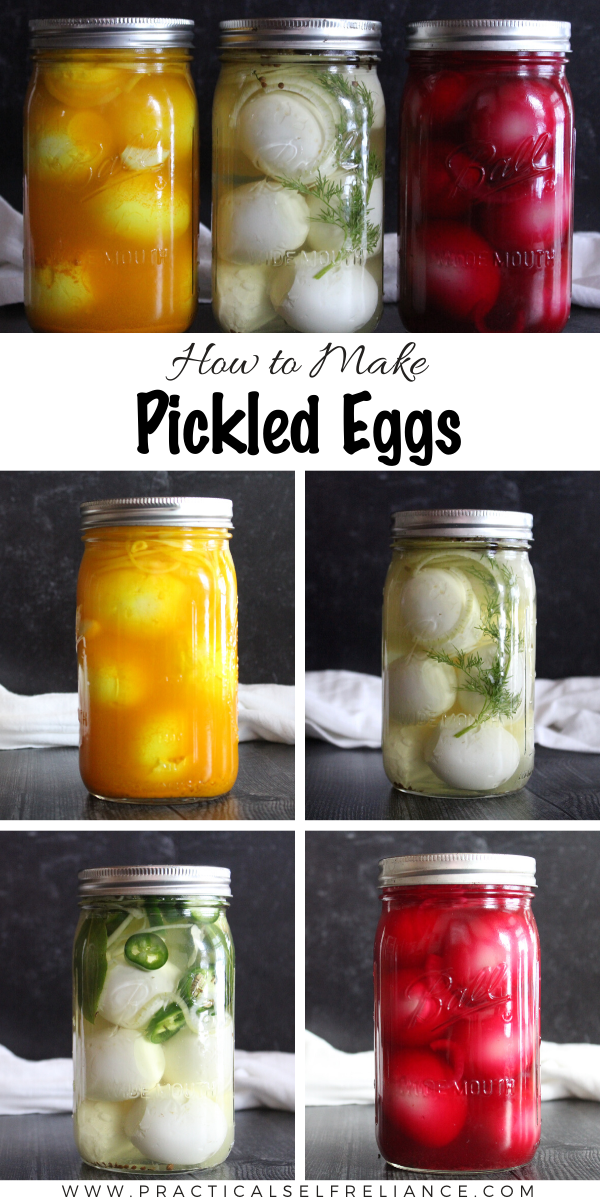
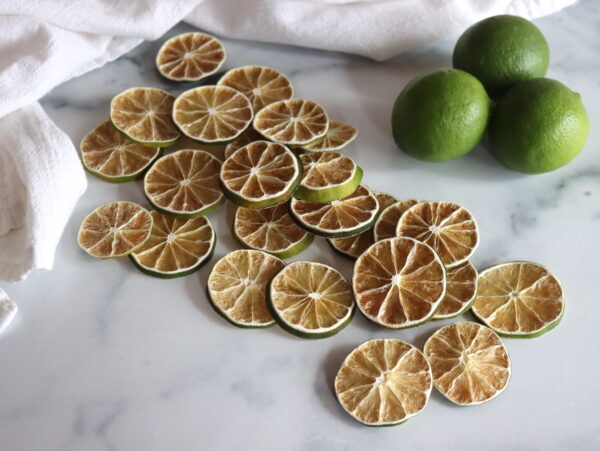
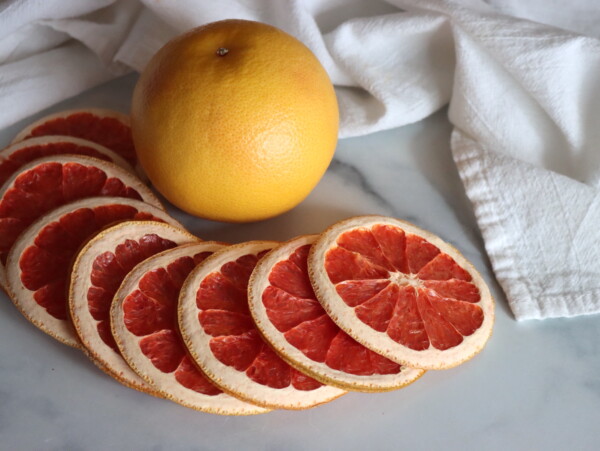
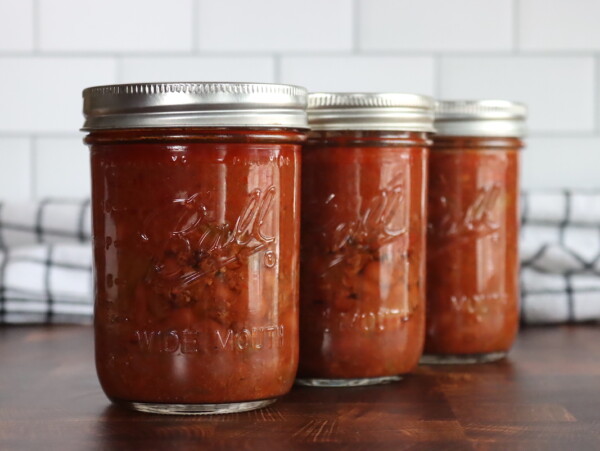
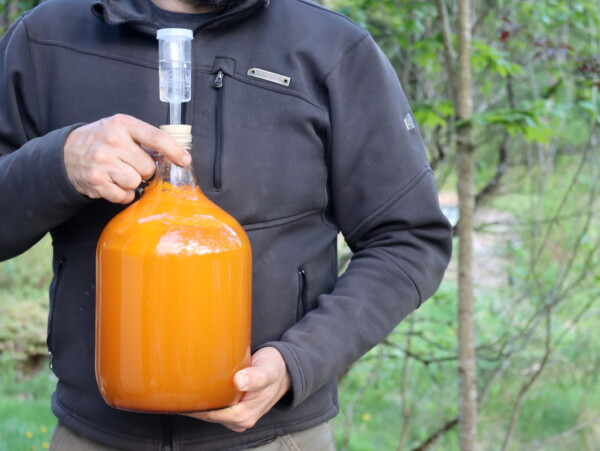





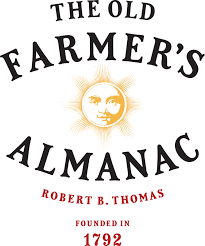




I tasted the bread and butter egg. 2 eggs in fact, after 24 hrs after making them. I love them…! I can’t hardly wait the two weeks. Thanks for recipe!
So glad you like them!
I am going to make some pickled eggs. I have pint mason jars and wondering can I use a plastic lids instead of normal mason lids and bands.
Yes, these actually work really well with those new Ball leakproof plastic lids (the grey ones). They hold up to the vinegar better than the metal lids do. Enjoy!
I’ve made beet pickled eggs for years. I peel, thick slice and gently boil the beets until tender. While hot, I add the pickling spice and sugar and let the spice steep while it cools. I also go with half vinegar and half beet brine however I use apple cider vinegar. I then layer the beet slices, raw onion and eggs in a large jar. Pour the brine over the eggs, beets and onions and refrigerate. The beet brine is so bright and potent that you can add a second batch of eggs to the same brine to pickle a second batch. I enjoy the pickled beets and onions as much as the eggs! Thanks for the new ideas.
That sounds absolutely delicious!
Thank you.
By the way, this is the only method for easy-peel hard boiled eggs that has ever worked for me with farm fresh eggs.
https://youtube.com/shorts/y8fmFzXaAI4?si=HzuKCFjeWU_5Ywt7